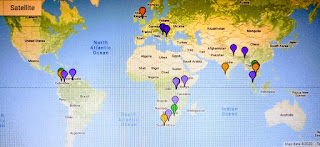Business Will Be Unusual And That Is How We Shall Beat COVID-19
COVID-19 Response and Recovery Plan-CREP (2020-2030)
Theme: To Empower Communities to Thrive
Sub-theme: Motivation Rooted in Resilience
Our work with Champions (Community Mobilisers) and as a team makes it possible to mobilise a large group of beneficiaries to form enterprising networks.
We run a resource center; a virtual work platform on which we are able to disseminate information; have developed small-scale businesses run by our beneficiaries including Champions.
We have been able to collect money which we used to pay for office space, administrative and other costs. However, to enable us sustain the progress we have achieved it requires money to support such an initiative.
This is why we came up with the COVID-19 Response and Recovery Plan-CREP 2020-2030. The seed money we intend to use will be used to: make savings; to pay subscriptions for Cooperatives; subsistence; utilities; rent; reinvestments.
The Advocacy Network Africa (AdNetA) Board of Directors approved a COVID-19 Response and Recovery Plan-CREP (2020-2030) for 90 CBOs in which it is hoped we shall reach out to about 3,700-5,400 beneficiaries including refugees.
This plan will help to address key challenges in promoting quality life practices as well to provide catalytic support and funding to help beneficiaries address areas not yet fully serviced by different initiatives.
The project activities are aligned with the strategic objective of providing quality services for sustainable development. We aligned ourselves with different plans which place great emphasis on linking quality health promotion and labour market.
The plan also draws from the different plans for response and recovery against COVID-19 which focuses on improving the quality of life, through: (i) improvement of quality life goals, outcomes and impact of day-to-day investments; (ii) development of relevant quality life promoting skills; (iii) improved social relations outcomes and (iv) improved efficiency and effectiveness in use of available resources.
The plan was designed with strategic input from the Community-Based Planning Teams (CBPT), and builds on piloted programmes supported by both Government and Development Partners, the donors, CSOs, NGOs, FBOs, Local Governments and well-wishers.
The plan is well aligned with the quality life goals: (i) Ensuring that all beneficiaries master basic literacy and numeracy necessary to pursue life’s dreams; and (ii) building systems that have capacity and integrity to deliver, support and promote quality of life. The plan focuses and is targeting resources which serve the most marginalized groups in urban poor settlements.
The plan is aligned with strategies on (i) Poverty reduction and boosting shared prosperity. (ii) Participatory Prevention Strategy (PPS), which promotes reaching out to make alliances in which it is possible to access traditional altruistic and philanthropy safety nets; investment of time and resources in participating, involving oneself in education of any kind, early, smartly and for all. The plan is also in line with the World Bank Country Partnership Strategy (CPS) which outlines the importance of: (i) human resource development to help people in Africa realize their full potential and to live in dignity, reduce inequality and social exclusion to develop shared prosperity; and (ii) improving skills development, notably for marginalised young people.
PLAN COMPONENTS:
Component 1: improving the foundations of learning by enhancing group dynamics (EGD), Strengthening Leadership and Implementation Competencies (SLIC) –complementing efforts to promote quality life for all; Strategic Public Health Awareness, Promotion and Quality Life Campaigns through the Participatory Prevention Activities (PPA).
Component 2: Strengthening capacity of management and accountability
The plan targets to improve capacity for engaging in income generating activities (IGA) on a regularized basis.
Component 3: Strengthening capacity for evidence-based financial independence policy development.
The Activities include: (i) Strengthening the Data Management Information System (DMIS) to make data more available, reliable and integrated; (ii) Enhancing the system for monitoring reporting and saving, for example during project life and the dissemination of results; and (iii) Enhancing the capacity to develop policies with respect to system equity, efficiency and quality, for example through support to consolidate all guidelines and regulations on quality standards and assessment procedures.
Component 4: Overall project coordination communication and monitoring and evaluation. This component would involve and finance:
The Grassroots based activities we shall promote include but not limited to:
Established range of Small scale occupations: Flower nursery management; car-detailing; small electrical repairs; care repairs; masks, napkins, toothpicks, bracelets, sandals, sheets, duvets, rags, mats, paper, envelopes, toys, water bottles, hair-care, grooming, decoration, pedicure, manicure, food, retail; Music, dance and drama; Bakeries; candles; School stationeries; Water bottles; leather belts; leather shoes; small toys; Paper Bags; Xerox and printing; T-shirt Printing; Photography; Beauty parlours; poultry; farming; car-detailing; scarfs, hats; bandanas, lapel badges and retail.
Please find time to support our work and follow us as we strive to contribute to beating COVID-19.










Comments
Post a Comment